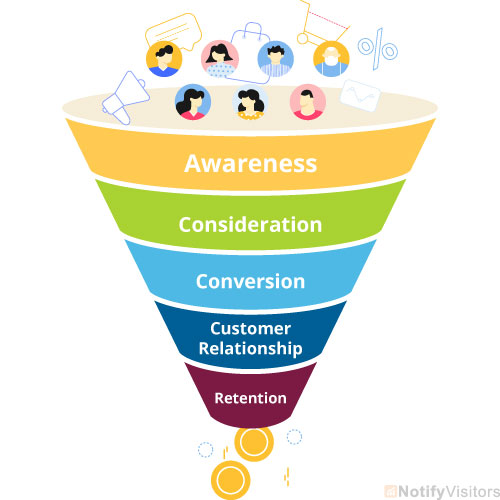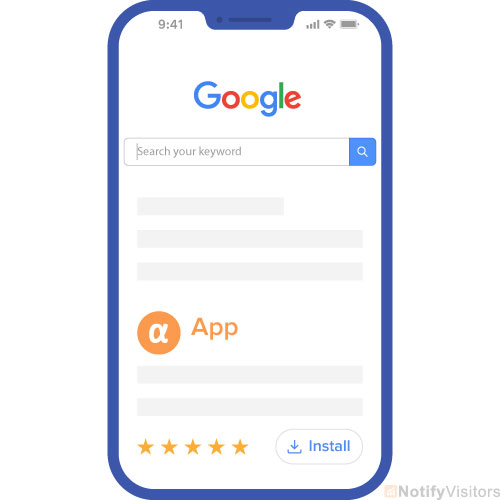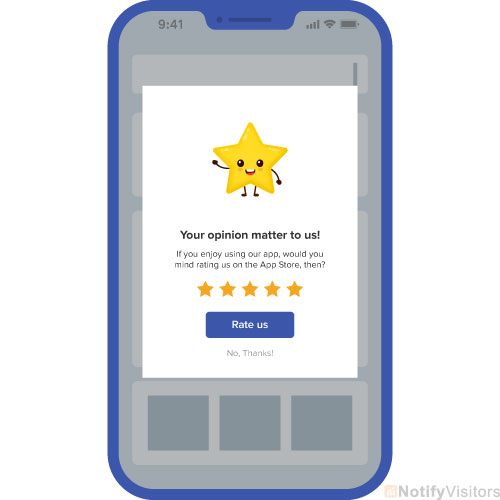With billions of smartphone users worldwide, smartphones have become vital communication tools these days. Businesses engage with this population using dedicated apps.
Mobile app marketing means employing different techniques and tactics to attract, engage, and retain app users to increase their overall lifetime value.
Mobile apps are increasingly being used for various objectives in these times when the world is recovering from the coronavirus pandemic. So, mobile app marketing has become all the more crucial nowadays.
Every business that launches a mobile app needs to have an app marketing strategy to succeed. It has to be thoughtfully designed, carefully planned and accurately implemented.
This blog provides you with all the information you need to successfully market your app.
Contents
What is Mobile App Marketing?

Mobile app marketing involves interacting with your users all through their lifecycle — from the time they become aware of your app’s existence, to the period when they become regular and loyal users.
To effectively do this, you need to identify who your intended app users are, where you can find them, what you need to tell them, and what they seek from you.
Mobile app marketing, therefore, involves guiding app users through the mobile app marketing funnel, which comprises of the five major phases:

- Awareness: This involves introducing your app to its potential users.
- Consideration: This involves engaging your target audience by sending them messages relating to your app, its value, and competitive advantages.
- Conversion: This involves encouraging prospects to install your app and nurturing them all through their onboarding.
- Customer Relationship: This involves connecting with your users by listening and responding to them.
- Retention: This involves making sure that your users stay happy with the app and brand experience. You do this by adding useful features, posting new content, and ensuring a seamless user experience so that they continue using your product.
As evident, mobile app marketing is a continual process, where you keep acquiring new users through the marketing funnel stages to bring about app installs, sales, and long-term engagement. Effective mobile app development and marketing strategies go hand in hand to ensure the success and sustainability of your app.
So, in reality, your users go back and forth through the funnel. That is why it is referred to as a ‘mobile engagement loop’.
Why is Mobile App Marketing Important?
In the introductory part, we told you that many businesses own apps to engage and retain their consumers. Almost all big brands and more than 65% of small businesses have already launched their mobile app.
With the market becoming increasingly saturated, there is serious competition. In whichever niche your business is in, you would be facing tough competition from thousands of similar apps.
In addition, you merely get 8 seconds to grab a prospect’s attention to motivate them into downloading your app.
This is where mobile app marketing helps. It helps you promote your app amidst the multitude of choices your users have.
Mobile App Marketing Tactics and Techniques
You need to take mobile app marketing efforts in two stages. One is during the app development phase, where you develop your app. And the other is during the post-developmental phase, which is after you launch your app.
During the App Development Phase
1. As decide the need your app meets:
You need to recognize the purpose the app will serve in people’s lives. It’s good to have a great idea, but you need to define who will use your app and solve what problem.
Once you can come up with answers to these questions, then you can come up with a pitch explaining why someone should download it.
An app need not always be developed to serve a complex issue; it can even address something straightforward. For instance, an e-store app should be designed to sell products that people look for.
If yours is a more specialized app, you need to come up with a simple explanation on how it would solve a particular issue faced by a specific audience.
For instance, a healthcare app should clearly state how it would serve to fix the health issue faced by a particular group of patients. Additionally, leveraging EMS ePCR software can significantly build a healthcare apps by providing efficient electronic patient care reporting for emergency medical services.
2. Define your revenue model:
The next step you need to make is identifying the way you will monetize it. It costs significantly to build your own app and market it.
So, you need to know how you will profit from it or at least how you will earn that money back. There are different revenue models to choose from. These include-
- Up-front fee + in-app purchases – This is a difficult model where people have to pay to use your app and then pay again for using more features.
- One-time, up-front fee – This is a simple model where people purchase the app upfront for a single-time fee.
- Free (“lite version”) + paid version – In this model, you provide a free app version that serves as advertising for the app and a paid app version that has more robust options.
- Free + in-app purchases – Also known as the microtransaction model, here downloading the app is free, but people need to pay to use its features.
- Subscription – In this model, the user pays a recurring subscription fee. So, you get a revenue flow that aids in developing the app further.
- Free + advertising – Here, the app can be used by people for free, but they have to pay a fee to remove ads.
Identify the revenue model which would be right for your app and its marketing plan.
3. Have a Great Site for your App:
Build an informative site for your mobile app. This will help prospective users discover your mobile application organically. Frontend development services can help ensure that your site has a user-friendly interface and is designed to attract organic traffic. Work on SEO as well. Also have features like a blog, live chat, etc. to engage your audience.
Make full use of website analytics tools to know how it is performing for optimizing your mobile app marketing strategy. A mobile app development company with expertise in marketing strategies can integrate the right features into your app to enhance user engagement and retention.” Ensure that your site is simple, fast-loading, easy to navigate, and mobile-friendly.
In case, having a fully-fledged website doesn’t suit your product, do have a comprehensive landing page for it.
4. Work hard on SEO:

In the earlier section, we told you that you need to use specific keywords in your niche. The keywords for some apps may come naturally and obviously. In some cases, it may not.
In both cases, you need to carry out keyword research using a free tool like KW Finder, Keyword Tool, WordTracker, etc. This will help you find both specific and derivative keywords.
Another crucial thing is that you begin your SEO efforts at least 60 days before launching your app. For, Google takes about 60 to 90 days to pick up your content and website.
This will help rank your site for specific keywords at the time you launch the app. If you’re building a mobile app, being visible from day one can give you a strong head start. Besides, work on the content too. Write authentic content that relates well with potential users.
5. Partner with influencers:

A report says that 49% of users download an app that is recommended by people they follow or trust online. So, partner with direct and social media influencers to market your app. Here is how you do it-
- Choose the right influencer: Ensure that the influencer you go for is a good fit for your field. He or she should be someone with numerous active followers, who are your target audience. His or her personality should be compatible with your brand voice.
- Keep your offer attractive: Reputed influencers keep receiving partnership offers from various brands. So, ensure that your offer is attractive and provides value to the influencer and his or her followers. You may consider giving discounts, exclusive access to features of your app, and other captivating rewards.
- Personalize your tone: When requesting an influencer to partner with you, make sure that you personalize your pitch. This way, you can avoid giving the message that you have simply copy-pasted the same message to several influencers. Additionally, give them a personal email address rather than a generic address.
6. Come Up with a Demo Video:
At times, your potential users may not have an idea about how to use your app and hence don’t know if it would benefit them.
So rather than developing a text document, create a 30-50 second demo video, clearly and crisply highlighting your app’s value proportion. For, the human brain processes visuals surpassingly faster than text.
Make your video look like a review. You can even incorporate animated characters to grab your audience’s attention. You can even try a live recording of your app in action.
Overall, the video should have a cool, contemporary, and sleep look and feel. Now, upload the video to your website and also on cross-promo sites, YouTube, and other platforms for sharing videos across the web.
7. Optimize for App Store:
The basis of your mobile app marketing strategy is App Store Optimization (ASO). Begin with a short, but all-inclusive app description. Also, optimize it for the right keywords so that it gets discovered. And choose the right product category to file your app.
Include screenshots of your app in the Google Play/ App Store. For, these act as one of your most vital mobile app promotion tools. Take care that the images are outstanding, self-explanatory, and with captivating captions. Also, ensure that your app listing is localized as suitable.
Collaborating with Android app development services to optimize app store listing details, including screenshots and descriptions. This can significantly improve your app’s discoverability in the Google Play Store or Play Store.
After Launching The App
8. Campaign your App:
Once your product goes live, start your app-install campaigns. Spend time and effort on Adwords/ Twitter/ Facebook/ to gain users. Initially concentrate on getting at least a few hundred users. Here are a few ways to do it-
- Paid social media campaigns: Paid social media campaigns can help you in this regard. After that, there’ll be some organic growth. Further, if many people download your app in its first week of launch, your product is likely to get featured, which will generate more installs.
- Channels: Identify those ad channels that bring you the most installs. This will help you direct your app promotion efforts and advertising budget on them. Also, remember to focus on the small networks with good potential for promoting your app. Besides, investing in organic growth too. While promoting your mobile app, use videos, infographics, and static and animated graphics. You can use Google, Facebook ads or mobile DSPs, mobile ad networks or OEMs.
- High Ranking Blog Owners: Reach out to blog owners who rank high on Google, preferably one of the top three on the first search engine page results. Write a personal email to those in the top 10 SERPs with an intro to your product and valid reasons why they should check out your app.
9. Get App Reviews:

Get as many users as you can to write reviews for your app. You do this in the following ways:
- Popups: Have push notification messages that motivate people to review the app.
- Emails: Send out emails asking users to review the app.
- A review plugin: Having a handy review plugin can persuade users to review within the app.
Since the quality and tone of the review matter, you need to take some effort toward gaining positive feedback. You can do this by-
- Instruct your customer support staff to ask happy users to leave feedback soon after helping them.
- Reward users to review your app. This may take forms such as a discount on the next month’s subscription, loyalty points, etc.
- Conduct contests across social platforms, different marketing channels, and forums to motivate your fans to leave reviews.
- Resolve issues that most users fuss about and inform them about them in your app listing’s comments section.
- Notify users of updates.
Post your reviews on popular review sites to gain more exposure and installs.
Conclusion
Mobile app owners need to employ effective mobile app marketing techniques and tactics to promote their app amidst the multitude of app choices their users have.
They have to apply some of these during the developmental phase and others after the app launch. The info in our blog serves as a complete guide to those.

























 Email
Email SMS
SMS Whatsapp
Whatsapp Web Push
Web Push App Push
App Push Popups
Popups Channel A/B Testing
Channel A/B Testing  Control groups Analysis
Control groups Analysis Frequency Capping
Frequency Capping Funnel Analysis
Funnel Analysis Cohort Analysis
Cohort Analysis RFM Analysis
RFM Analysis Signup Forms
Signup Forms Surveys
Surveys NPS
NPS Landing pages personalization
Landing pages personalization  Website A/B Testing
Website A/B Testing  PWA/TWA
PWA/TWA Heatmaps
Heatmaps Session Recording
Session Recording Wix
Wix Shopify
Shopify Magento
Magento Woocommerce
Woocommerce eCommerce D2C
eCommerce D2C  Mutual Funds
Mutual Funds Insurance
Insurance Lending
Lending  Recipes
Recipes  Product Updates
Product Updates App Marketplace
App Marketplace Academy
Academy

